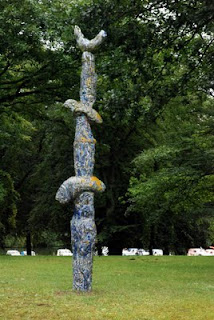
"I always prefer to believe the best of everybody, it saves so much trouble."
- Rudyard Kipling
After quoting from Rudyard Kipling's poem "If" yesterday, today I would like to write about another quote of the writer, which is the one above.
To me, the wisdom of the two parts of this statement must be examined separately because they are about two different issues. One issue is whether we should choose to "believe the best of everybody". The other issue is whether doing so "saves so much trouble".
One thing that always impresses me when I travel to Europe is how things operate on the principle of mutual trust. Take public transport as an example. One can take buses and trains (not all, but many of them) without making payment or showing proof of payment. One should pay his fare, of course. In Denmark, based on my experience and observation, there are at least three ways of paying one's bus fare: buying a ticket from the driver, buying a ten-trip ticket and insert it into a machine on the bus for punching information about the number of uses, or, in the case of tourists, buy a card (the one for Copenhagen is called Copenhagen card, the one for Aarhus is called Aarhus Card, etc.) which entitles the holder to free travels within certain zones for a certain number of days. But except users of the first way which comes across the driver as gatekeeper, other passengers can freely hop on and off buses. The same goes for many train services. Of course, I am not saying that you don't have to pay. The onus is always on the passangers to show evidence of payment when required, even though we never had to show our Copenhagen Dards and Aarhus Cards during our stay in the cities. In Hong Kong, passengers must swipe the Octopus card or insert the ticket or money to get in. Period.
During such bus or train trips, there are a number of things I always wonder about: Has everyone really paid? Would they be caught if they hadn't, like if I did not have a Copenhagen Card or an Aarhus card indeed? Why don't those European countries install a card reader or a turnstile like we do when obviously they have the technology and resources to do so? Why don't Hong Kong adopt such a system?
Another example of mutual trust is related to accommodation. For all the Bed and Breakfast places we stayed at during this trip, all that they knew about us was from the emails I sent them for booking. In some cases, we just met the owners once, when we arrived. They explained everything. We paid. That was it. When we left, we dropped the key in the mailbox. No credit card numbers or personal identification documents or checking out were ever required. In my country, a traveller cannot possibly check in to any lodging without showing documents, or check out without someone coming to the room to confirm that nothing is missing. Again, I wonder whether such an operation system can be adopted in where I come from.
What these systems reflect is that people in Europe are more ready to "believe the best of everybody". And the fact that service providers have not lost confidence in the systems reflects that the principle of mutual trust has not been abused - not seriously, at least. As for Hong Kong and China, my belief (and certainly also the belief of the service providers) is that using these systems would produce disastrous results on revenues as there would be huge number of cases of non-payment. Now notice that this is just a belief. The fact may or may not be like that. But that is precisely the point. We are talking about beliefs here. I have to confess that I don't have much trust in my own people (and, I believe, vice versa), and this lack of trust is based on past experience and acculturation. My past experience and acculturation tell me that in our culture, believing the best of everybody DOES NOT save trouble. It CAUSES trouble.
It is certainly nice that we can believe the best of everybody because it is more peaceful and less stressful that way. If the trust is mutual, and if the mutual trust is complemented by mutual respect, then it can, as Rudyard Kipling said, save so much trouble. Otherwise, if the trust is abused by one party, then the other party is in trouble. This has happened so often in our culture that we have all got wiser. And while this has not been such a problem in some parts of the West that systems which operate on mutual trust still have a place, I am certainly not suggesting that there are no such abuses in those parts of the world at all. As my story on 9 and 10 August shows, I almost had my wallet stolen in a country that is considered to be highly developed and one of the safest in the world.




















































